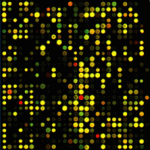Genomics
|
5 january 2019 17:00:07 |
| Comparison and assessment of family- and population-based genotype imputation methods in large pedigrees [RESOURCES] (Genome Research) |
|
Tweet Genotype imputation is widely used in genome-wide association studies to boost variant density, allowing increased power in association testing. Many studies currently include pedigree data due to increasing interest in rare variants coupled with the availability of appropriate analysis tools. The performance of population-based (subjects are unrelated) imputation methods is well established. However, the performance of family- and population-based imputation methods on family data has been subject to much less scrutiny. Here, we extensively compare several family- and population-based imputation methods on family data of large pedigrees with both European and African ancestry. Our comparison includes many widely used family- and population-based tools and another method, Ped_Pop, which combines family- and population-based imputation results. We also compare four subject selection strategies for full sequencing to serve as the reference panel for imputation: GIGI-Pick, ExomePicks, PRIMUS, and random selection. Moreover, we compare two imputation accuracy metrics: the Imputation Quality Score and Pearson`s correlation R2 for predicting power of association analysis using imputation results. Our results show that (1) GIGI outperforms Merlin; (2) family-based imputation outperforms population-based imputation for rare variants but not for common ones; (3) combining family- and population-based imputation outperforms all imputation approaches for all minor allele frequencies; (4) GIGI-Pick gives the best selection strategy based on the R2 criterion; and (5) R2 is the best measure of imputation accuracy. Our study is the first to extensively evaluate the imputation performance of many available family- and population-based tools on the same family data and provides guidelines for future studies. |
| 111 viewsCategory: Bioinformatics, Genetics, Genomics |
 Minerva: an alignment- and reference-free approach to deconvolve Linked-Reads for metagenomics [METHOD] (Genome Research) Minerva: an alignment- and reference-free approach to deconvolve Linked-Reads for metagenomics [METHOD] (Genome Research)Global analysis of protein homomerization in Saccharomyces cerevisiae [RESOURCES] (Genome Research) 
|
| blog comments powered by Disqus |
MyJournals.org
The latest issues of all your favorite science journals on one page
The latest issues of all your favorite science journals on one page



